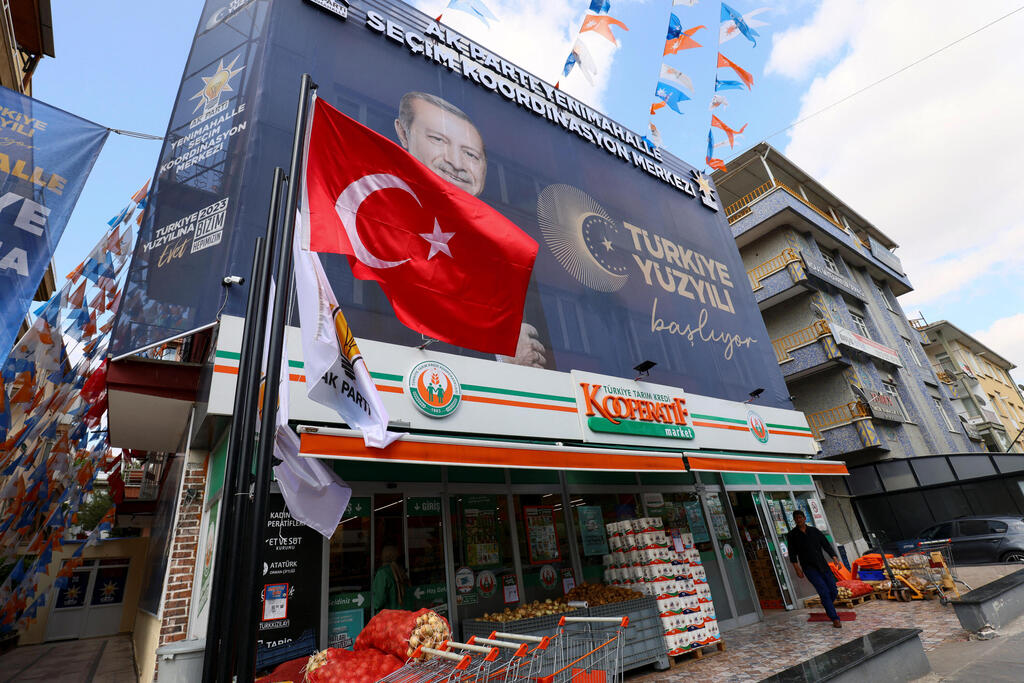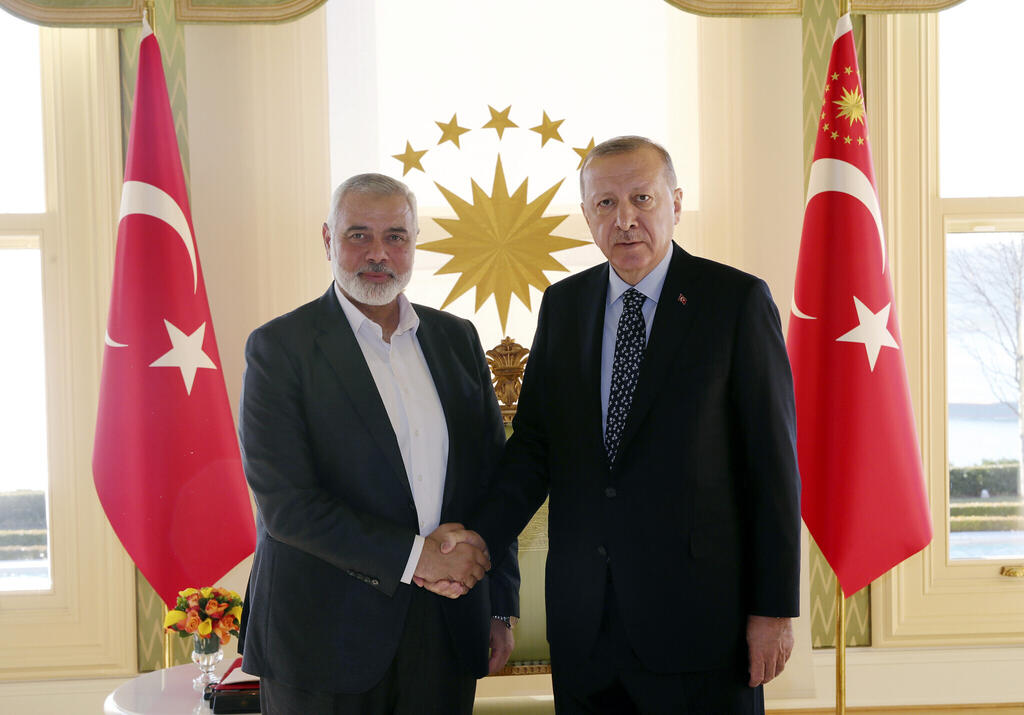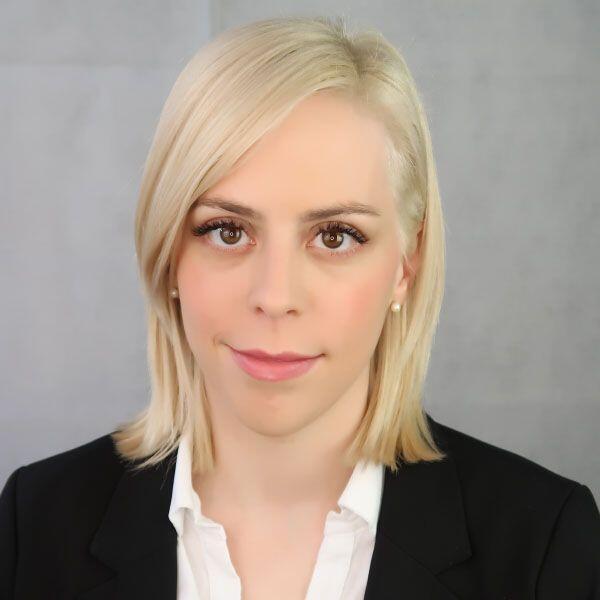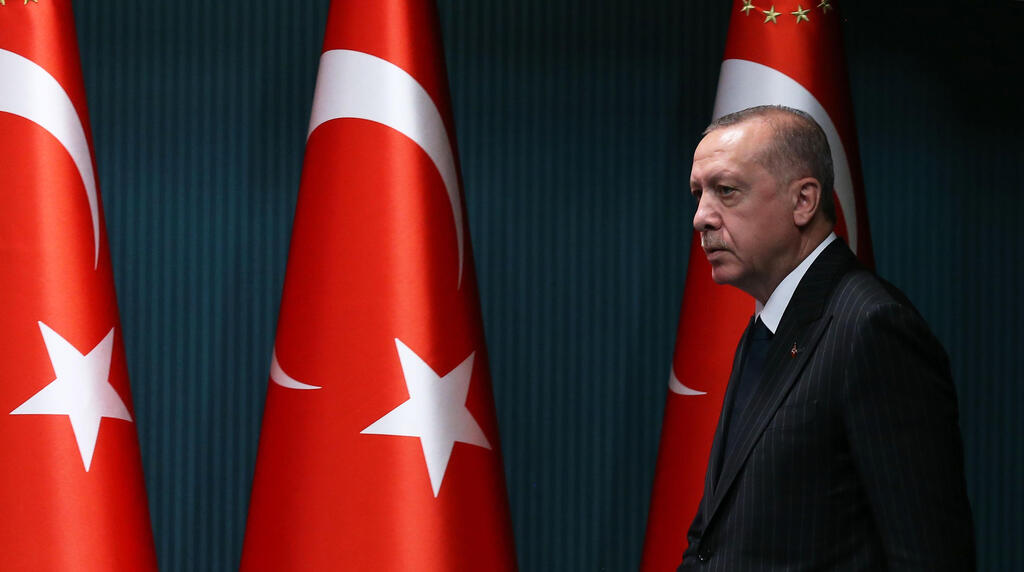Getting your Trinity Audio player ready...
Mass Erdogan election rally
(צילום: רויטרס)
For the first time in two decades of Turkish President Tayyip Erdogan’s rule, he may be looking at the end of his political career.
Read More:
Today, May 14, the people of Turkey will head to the polls to vote for a new president and for the parliament for a 5-year term. The two leading candidates for president are the incumbent, Erdogan, and opposition leader Kemal Kilicdaroglu – who has publicly identified himself as one of Turkey’s ethnic minorities, an Alevi.
3 View gallery


A banner of Turkish President Tayyip Erdogan is seen ahead of the May 14 presidential and parliamentary elections
(Photo: Reuters)
Kilicdaroglu is the leader of the Republican People's Party (CHP), which was established by Mustafa Kemal Ataturk - the founder of modern Turkey, whereas Erdogan is the leader of the Islamist AK Party. While it’s possible Erdogan could lose the vote for President, the winner will still need to form a coalition which makes it even less likely that Erdogan will finally be on his way out, but some Turks are hopeful.
This election comes at a critical time in Turkey when the nation is facing immense economic stressors such as a hard currency reserve problem and is still reeling from the catastrophic earthquake which occurred in February this year and claimed the lives of nearly 60,000 people. As a result, Erdogan’s popularity has plummeted, though as an incumbent he certainly still enjoys a loyal following.
For many in Turkey however, much of the mismanagement of the earthquake was precisely because of authoritarian leader Erdogan, and many are hopeful this will be his final term, despite concerns over the fact that “free and fair” elections are far from guaranteed under Erdogan. As of the week before the election, Erdogan was polling at roughly 45%.
Sinan Ciddi, the non-resident senior fellow on Turkey at the Foundation for Defense of Democracies, says that Turkish elections are “absolutely not” free and fair, but explains that with a massive victory, it would become incredibly difficult for Erdogan to maintain control.
“Look, the amount of air time that the opposition has gotten on public broadcasters, as well as the mainstream media, has been little. There's been a lot of disinformation. There have been public attacks at campaign rallies recently. The government continuously threatens to use the full force of incumbency to undermine the opposition. That being said, polls suggest that the opposition may be poised to basically wrestle power out of the hands of Mr. Erdogan.”
While there has always been some opposition to Erdogan’s Islamist approach to Turkey, many of the people who previously would have supported him are growing in frustration and voicing opposition. This should not be taken lightly, as previous attempts to drive Erdogan out of power have resulted in oppressive crackdowns and arrests of political rivals and their allies, as well as wide-scale media censorship and arrest of journalists and academics.
For the Jewish community, most believe that Kilicdaroglu will be a better candidate for minority rights as he himself is an ethnic minority, and he has been vocally supportive of Kurds. That being said, living under the authoritarian tendencies of Erdogan has its price – the majority of the Jewish community was concerned about even commenting to Ynet on the election.
“I think the Jewish community inside of Turkey would be looking strongly towards his candidacy succeeding simply because they see him as a better guarantee of minority rights in Turkey, especially Jewish identity than Mr. Erdogan, who is a big question mark,” says Ciddi.
Betsy, a member of the Istanbul Jewish community who now lives in Israel, told Ynet, “I believe that Kemal Kilicdaroglu will win the presidential election however his alliance will not win the general elections. So it will be a management crisis and a new election might be needed."
That being said, Betsy explains that it's not minorities within Turkey who are leading the charge against Erdogan. "I don't think that minorities play any part in this game. The block against Erdogan seems to surround everyone... there won’t be any changes with regards to religious minorities," she says.
However, while Kilicdaroglu seems favored by the Jewish community and many others, he is far from being a pro-Israel leader. In fact, Ciddi says, “he's actually on record basically saying that he's against deepening ties with Israel.”
Ciddi explains that also isn’t necessarily cause for concern, “...right now, based on public opinion in Turkey against Israel, he really doesn't want to rock the boat and take a strong pro-Israeli stance. I don't think he has any ambitions to essentially torpedo the relationship. But I think he's not necessarily going to turn a fresh page and make Turkish-Israeli relations the poster child of his foreign policy.”
As for the support of terrorist organizations like Hamas – a longstanding tradition of Erdogan’s leadership, Ciddi believes that should Kilicdaroglu win the election, there may be a change of tune towards radical groups.
3 View gallery


Turkey's President Recep Tayyip Erdogan, right, shakes hands with Hamas terrorist movement chief Ismail Haniyeh, prior to their meeting in Istanbul, February 1, 2020
(Photo: Reuters)
“I would expect that if he is the President, at some point he would seek to essentially end the existence of Hamas on Turkish soil by shutting down their offices…Because he's going to have to be consistent on the issue of terrorism. If he wants the international community to respect Turkey, because of sensitivities over the PKK and Kurdish separatism, then he can't have it both ways and essentially has to take a strong stance on Hamas,” explained Ciddi.
The polls open Sunday at 8:00 AM, but the media is only allowed to report on the election after 9 PM Turkish time. In the last election, 87% of Turkish voters turned out to vote. The turnout is expected to be similar in this election.






